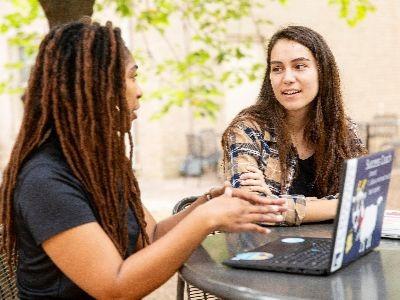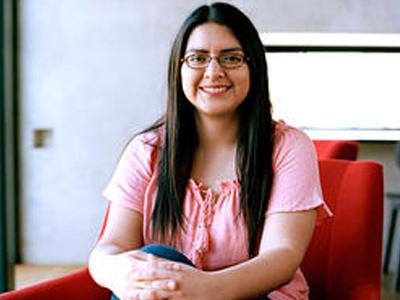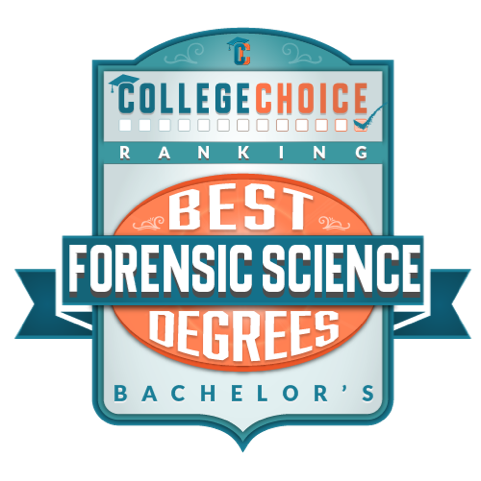Play a critical role in the justice system by preparing scientific work to be presented in courts of law.

Major Roadmap
Explore your options — classes, internships, research and study abroad. Browse the Forensic Science Major Guide to find what interests you, discover what you love, and create a major experience that jumpstarts your future.
The mission of the forensic science program at St. Edward’s University is to prepare the next generation of socially conscious and scientifically sound forensic scientists.
As a Forensic Science major, you’ll learn how to collect and analyze evidence from crime scenes so it can be used in court cases or the criminal justice system. Become an expert witness in criminal cases, or work in the field as a crime scene or fingerprint technician. Unlike in popular TV shows, crime scenes never have easy answers — but you’ll learn how to approach them in a methodical, detail-oriented way that engages both critical and creative thinking.
You’ll learn crime scene investigation techniques, scientific methods for analyzing the data you collect, and legal and ethical protocols. Get hands-on experience at mock crime scenes, like the one Associate Professor of Forensic Science Casie Parish-Fisher set up using the remains of deceased hogs at Wild Basin Creative Research Center, an Austin wilderness preserve managed by St. Edward’s. Intern with the Austin Police Department, the Travis County Medical Examiner’s Office or other law enforcement agencies, and graduate ready to use science to create a more just and safe society.
What do our graduates do?
Forensic Science majors go on to a variety of careers and graduate schools from St. Edward’s. Here’s a sample.
- Pursuing careers at the Texas Department of Public Safety, Travis County Sheriff’s Office, Travis County Medical Examiner’s Office, Austin Police Department, Houston Forensic Science Center, San Antonio Police Department and Round Rock Police Department
- Attending the South Texas College of Law
- Attending graduate school at Sam Houston State University, University of North Texas and University of Central Lancashire
- Attending medical school at the St. George’s University Charter Program to Medicine and the Universidad Autónoma de Guadalajara Medical School

The Thrill of Discovery
Undergraduate research at St. Edward’s connects students with professional mentors, encourages them to take on new challenges and helps some find careers they never imagined. Read about five students, including a Forensic Science major, whose research is finding answers.
The Classroom and Beyond
The Forensic Science program applies scientific concepts to legal matters, bridging the worlds of science and law. Your classes will teach you the skills you’ll use on the job, and you’ll practice them at virtual and in-person simulated crime scenes. Research is a critical part of expanding methodologies used in forensic science, and you’ll have a chance to conduct research that can help expand the techniques used in the field. You also can join student organizations that help you network and give back to the community.
Experiential Education
Your classes are taught by professors who have years of experience in the field and keep up with new developments as forensic science evolves. Each course is designed to give you an immersive, engaging experience that parallels real-life scenarios you’ll encounter in your career. For example:
In Crime Scene Photography, you will learn the parts of a digital camera, learn to document indoor and outdoor scenes, and practice photographing wounds on faux body parts, creating a portfolio of your work. You also will review photographs in a virtual setting using virtual reality headsets in order to explore the immersive experience of being on a crime scene.
In Crime Scene Investigations I & II, you’ll assess and document mock crime scenes that simulate common field experiences. You’ll also process simulated evidence with field and laboratory techniques. Some of these mock crime scenes are staged in person, either on the main St. Edward’s campus or at the Wild Basin Creative Research Center. For others, you’ll use a virtual reality headset or your computer to investigate evidence at mock crime scenes — like a hotel room where a body was found — and click on hotspots with embedded photos and case information.
In Forensics in the Wild, you’ll explore the distinct challenges for investigating crimes committed outdoors. You’ll critically analyze environmental factors affecting outdoor crime scenes and learn to evaluate samples within forensic botany, soil recovery and analysis, and anthropology.
In Principles and Practices of Science and Law, you’ll explore the interaction between the ideas and practices of the scientific community and the legal community. Taking on the persona of an expert witness, you’ll prepare to present a piece of forensic evidence in a mock criminal trial. You’ll also pose as an attorney, calling the “expert” to testify.
Study Abroad
History and Philosophy of Science, a required course for Forensic Science majors, has been taught both on campus and abroad. When taught in London and Edinburgh, the class focused on the history of medicine and disease and how it intersects with the history of crime. Students in the course visited sites in London related to scientific and medical history, including the Alexander Fleming Museum, which showcases the laboratory where Fleming discovered penicillin. They also visited the Surgeons’ Hall Museums in Edinburgh, which has collections of pathological anatomy specimens and an anatomy theater with an interactive dissection table.
Student Organizations
The Forensic Association Committed to Truth – SEU F.A.C.T. for short – is the student organization dedicated to forensic science and meets biweekly. Members build their networks and learn about careers. F.A.C.T. also hosts fun collaborative events that give you the chance to explore other science-based fields, like teaming up with the American Chemical Society chapter to conduct spooky Halloween-themed experiments.
The St. Edward’s Criminal Justice Club is a chapter of the American Criminal Justice Association, Lambda Alpha Epsilon. The club meets twice a month to hear guest speakers, go on field trips, offer community service and complete training together.
The St. Edward’s student affiliate chapter of the American Chemical Society hosts guest speakers who talk about their research, industry jobs and the ins and outs of graduate school. Members have volunteered at the ACS Southwest Regional Meeting and given poster presentations of their research, and they have traveled to other universities for hands-on training at advanced instrumentation workshops. SEU ACS also hosts social and fun events like tie-dyeing lab coats and movie nights.
Service
Forensic Science students have worked for several years on a grant-funded STEM outreach program for sixth-graders. The St. Edward’s students create crime-scene kits that the younger students use to solve a case. The program encourages elementary- and middle-school students to get curious about careers in science.
Degree Requirements
Major Requirements: The Bachelor of Science in Forensic Science major requires 96-97 hours of Forensic Science major courses, including courses in subjects such as Bioinformatics, Chemistry, Mathematics and Physics.
General Education Requirements: In addition to the major program requirements, all students must satisfy the general education requirements. Talk with your success coach and faculty advisor about which courses are right for you.
View and download the full degree plan for the BS in Forensic Science major (PDF). This helpful course map shows the sequence of prerequisites in the department.
Research
You’ll advance the state of forensic science by conducting research into potential new technologies and techniques. College students can test whether these techniques show enough promise to merit investment by professional labs. Through your research, you’ll address challenges currently being faced by investigators in the field and build marketable skills. Some examples of past projects include:
Developing a novel dual chemical that reveals the presence of blood, using titanium dioxide — which turns blood white and makes it visible on dark surfaces — and a fluorescent-based chemical, which makes blood stand out even on a marbled or multicolored background.
Working with a professor to test a new rapid DNA profiling machine on biological samples that had been burned, simulating samples from a fire scene. That capability would be important in disasters where multiple victims needed to be identified through DNA analysis.
Comparing two methods for processing DNA profiles on porous surfaces, such as paper and carpet, using a chemical enhancer that reacts with amino acids to make evidence like fingerprints or blood more easily visible.
Internships
You’ll have an opportunity to apply for internships where you’ll utilize some of the same skills you’ve been developing in your experiential classes. Forensic Science majors have earned highly competitive internships at state and local agencies, including:
- Travis County Medical Examiner's Office
- Austin Police Department
- Travis County Sheriff's Office
- Leander Police Department
- El Paso Police Department
- Bexar County Sheriff's Office
Our Faculty

Dr. Parish Fisher's research interest involves DNA analysis, specifically direct-amplification and rapid DNA analysis for field use. Her projects have centered around generating DNA profiles post-chemical and powder processing for latent prints, post-chemical enhancement for latent blood impressions, and biological samples which have been exposed to fire.
– Casie Parish Fisher, Assistant Professor of Forensic Science and Director of the Forensic Science Program
Forensic Science Minor
Students who are interested in the forensic fields can get a minor in Forensic Science in order to establish baseline knowledge and experience within the subject. This is especially helpful for individuals who are interested in pursuing careers where forensic knowledge enhances their job applicant profile.
Required Coursework
- Criminology
- Intro to Forensic Science
- Crime Scene Investigation I with Lab
- Crime Scene Investigation II with Lab
- Crime Scene Photography
- Professional Practica in Forensic Science
Are you a current student? Contact your advisor for next steps on declaring your major or minor.

Named Among Best Forensic Science Programs
The Forensic Science major in the School of Natural Sciences at St. Edward's University is ranked among the top-25 Bachelor in Forensic Science degree programs by College Choice. Our Forensic Science major offers students the option to customize their degree with either a lab or field emphasis and prepares them to take on roles as crime scene investigators and personnel within crime laboratories.
SEU to You
Virtual mock crime scenes and VR headsets meet in-person crime-scene sketching and evidence processing in Associate Professor of Forensic Science Casie Parish Fisher's Crime Scene Investigations course.